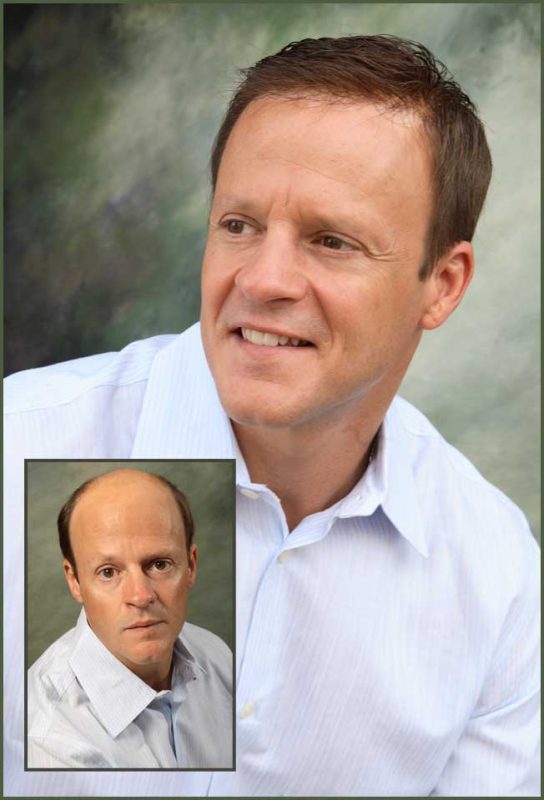National Hair Centers
Rebuilding Lives by Restoring Hair
By Susan Cushing
“It’s not about the money, it’s about results.” With sincerity and conviction, this is both the philosophy and promise of National Hair Centers, the world’s largest hair restoration and hair replacement treatment center.
Human nature is a fickle and often incomprehensible thing. With pride and even flamboyancy people will boast about their latest Botox injections, facelift, tummy tuck or breast augmentation. Women sometimes change their hair color as frequently as their handbags, yet when it comes to discussing (let alone admitting to) hair loss, there is a deafening silence – or unkind laughter. A taboo subject made worse by comedians and everyone looking for a cheap joke.
Myths blur the situation further. It’s not just old grandpa Joe or middle-aged Uncle George who are affected. The truth is hair loss is not relegated to aging men. Young men, as soon as their early 20s, women and even children are affected by various genetic or other conditions that render them victims of embarrassing hair loss.
It’s not funny, it’s not vanity and it’s not something that should cause shame. We all happily embrace every other modern scientific advancement – Lasik eye repair, rhinoplasty and even liposuction. So why should those who look in the mirror and no longer recognize themselves due to hair loss feel the need to suffer in silence?
Located in Phoenix, National Hair Centers has helped thousands of men, women and children find the right solution to their hair loss challenges. They offer all the most up-to-date and effective hair loss solutions available. While most similar companies can only offer one or two treatment options, National Hair Centers offers a multitude of choices and provide the expertise to help each client find the one best suited to their particular needs.
“We’re not trying to be a discount or cut-rate center,” says Sean Dirodis, owner and president. “Quality and customized service does not have to be wildly expensive. We offer both at an affordable price and with manageable payment options.”
Generally speaking, the best candidates for surgical hair transplantation include men experiencing male pattern baldness for several years and individuals who have lost their hair due to burns, accidents or other trauma.”
Compassionate Counsel
Just as with any other problem or challenge, the first step is recognizing that it exists. But that’s not the hardest part. What’s truly difficult, to the point of terrifyingly immobilizing, is seeking help.
“It’s very personal and very emotional,” says Dirodis. “It’s bad enough for men, but imagine if you’re a woman with hair loss; it’s both traumatic and humiliating. Unless you’ve experienced it, you cannot imagine how hair loss affects every aspect of your life. It affects your self-confidence, the way you interact – or don’t – with others, and underlying all of this is the shame that somehow it shouldn’t bother you because society tells you it’s vanity.
“We understand this and provide not only years of experience and the most advanced treatment options, but also sympathetic consultants who truly listen to what our clients are saying.”
Dirodis speaks from experience. Not just because National Hair Centers has helped hundreds of men, women and children successfully resolve hair loss issues, but because he’s been through the experience himself.
“I was about 22 when a guy at work came up and put his thumb to the back of my head,” Dirodis says. “He said, ‘You’ve got a bald spot right there.’ I was shocked I guess, I never noticed it before. But then, I started thinking about my mom’s side of the family. I had an aunt that was completely bald and grandmother with very thin hair.”
Initially Dirodis says he tried to pretend his hair loss didn’t bother him. A bravado that many men and some women assume in the face of this devastating discovery. Eventually, supported by his wife, Dirodis sought help. The results changed his life. Once again, the young man he remembered looked back at him from the bathroom mirror.
“That’s one of the reasons people feel comfortable at our centers,” he says. “We understand because many of us have experienced it ourselves. I remember at one point not even wanting to leave the house. I no longer felt (or looked) like me. It was horrible. But, at the same time, I was reluctant to follow up on those commercials I’d see on TV. It felt embarrassing somehow. I’m so glad my wife encouraged me. I feel like me again.”
Co-owner and transplant image consultant Gene Gaspar has a similar story. He began losing his hair at 23 years of age. Even though he felt young, the aging process was on a fast track because he was already balding. Unlike Dirodis however, Gaspar was quick to respond and began researching various treatment options.
“At the time of my hair loss I first tried the hair transplant procedure,” says Gaspar. “But, 20 years ago the procedures were still in the early stages and the look was not natural or attractive. They didn’t have the natural mesh so there was no hairline and I had to comb my hair forward to cover it. I did that for several years, until finally hair transplants reached the stage where they were using mini and micro grafting, with individual follicles.”
Interestingly, while each of these men had virtually identical hair loss experiences at basically the same age, the treatment options for each were vastly different. Not only a matter of choice, the right treatment is a personalized process based not just on preference but on how advanced the hair loss is and what is physically and medically appropriate.

Regardless of the degree of hair loss, lifestyle or preferences, it’s a one-stop emporium offering only the latest and most trusted treatments.”

Treatment Options

Generally speaking, the best candidates for surgical hair transplantation include men experiencing male pattern baldness for several years and individuals who have lost their hair due to burns, accidents or other trauma.
During hair transplant surgery, hair is taken from the back of the head and transferred microscopically to the front. Most women are not candidates for transplants because they lose their hair differently than men. While men tend to lose hair on the top of their head and in the crown, leaving good “donor” hair in the back, women’s hair loss is generally more diffused over the entire head. Frequently, there is no good donor area available for transplantation.
For women who do not qualify for hair transplant surgery, options are plentiful and extremely appealing. For example, NHC offers an exclusive hair extensions program. Participants undergo regular, scheduled hair extensions maintenance. This not only ensures the beauty and natural appearance of the hair extensions, it helps us to protect the integrity of existing hair. Extensions customers have access to certified stylists, Arizona’s best selection of hair extensions, and precision coloring and styling.
To further enhance the comfort and treatment for those women experiencing hair loss, NHC has female image and treatment consultants with years of experience and sympathetic ears.
“Ultimately, you need to approach any of these treatments with the right mindset,” says Dirodis. “No matter what promises you’ve heard on TV or elsewhere, the reality is your hair is not going to be ‘fixed,’ nothing will give you your hair back. The goal here is to help you look like yourself again, and in a way that does not make you feel different or self-conscious.”
“It’s important to have the right people advising you,” adds Gaspar. “Sean and I have been doing this for 20 years and we emphasize that we both have been in exactly the same spot, so we can completely relate. However, we also have the expertise to know what is feasible for each person who walks in the door, and we are always very honest. We won’t give false hopes to someone who walks in here with their heart set on a transplant if they just aren’t a good candidate. There are too many excellent options and Sean is an excellent example of that.”
While it has long been a myth that only hair transplants can afford a natural lifestyle, NHC’s success stories bust that fable. As noted by Gaspar, when Dirodis started losing his hair in his early 20s, he didn’t immediately seek any treatment. When he did, he discovered he was not a good candidate for hair transplant surgery. However, with hair replacement, in his own hairstyle, he was able to return to the life and attitude he had enjoyed before.
“We’re all trying to look our best,” says Dirodis. “I got this great hairpiece and it made me feel like my old self. The only thing was, at first, I was afraid to go to the gym or at least shower there. But the way these are made today and personally fit, I can work out, shower and don’t even think about it. It’s as much a part of me as anything else.”
The biggest issue with hair loss, aside from the stigma attached, is recognizing that it’s happening. This might seem obvious, but as in Dirodis’ case, it took a co-worker to point it out. Because hair loss can be very gradual, statistics show that most people have already experienced as much as 45 percent hair loss before they realize it. Unfortunately, pride or embarrassment often delays their seeking help, which means the loss could be even greater before treatment begins.
While there may still be hesitation to acknowledge hair loss, the hair restoration industry is becoming increasingly popular and highly technologically advanced. Gone are the days when the only solutions were toupees or wigs that looked unnatural and comical or hair transplants that were so obvious that they were distracting.
The solutions are out there; it’s just a question of finding the right experts with qualified staff, multiple options, and more than 20 years of success. National Hair Centers reputation for excellence is evident in their loyal clients and list of awards.
“Most people don’t want to be here,” says Dirodis. “I get it, so does Gene. But we want to make it very clear. It’s OK to be here! We want to break down those barriers because we can offer real solutions. We know when a satisfied client walks out of here, we’ve given them back much more than their hair.”
Treatments
Non-Surgical Hair Systems For Men: NHC offers the most technologically advanced, custom designed prosthetic that acts like an eighth layer of skin, with individual hairs injected strand by strand. It’s not a wig, not a hair piece, and a million miles away from anything resembling a toupee, hair replacement systems at NHC have helped thousands of men regain a full head hair. They are comfortable, lightweight and completely natural looking. In fact, they are completely undetectable to both sight and touch.
Non-Surgical Hair Systems For Women: NHC offers hair loss solutions through the blend of scientific advancement and pure artistry. Stunningly natural and perfectly matched. A choice of three superb options: Virtuesse, Follea for Women, and European Hair. Each is designed for optimum results and a natural appearance no matter how closely they look.
Retention Regrowth Products: For those in the early stages of hair loss, there are three scientifically proven and FDA approved solutions: Propecia, Rogaine and Minoxidil. NHC offers these and so much more! They carry a full line of all of the most effective FDA prescription drugs and over-the-counter hair regrowth products including hair growth vitamins, shampoos and conditioners.
PRP: Platelet Rich Plasma or PRP, is a medical breakthrough in the science of hair restoration that utilizes the patient’s own blood platelets to effectively stimulate hair growth, safely and naturally. PRP has been studied and developed by doctors, producing excellent results for their patients. NHC is proud to be on the forefront of this remarkable PRP advancement of this revolutionary treatment.
Laser Treatments: Low level, “cool” laser light therapy (LLLT) has been clinically proven to stop hair loss and regrow healthy hair. NHC’s physician supervised laser hair growth program utilizes the latest FDA cleared technology for hair loss. However, laser treatments are not for everyone. Hair follicles are necessary to re-grow hair, so someone who is completely bald would not benefit from this solution.
Hair Transplants: Hair transplants have permanently solved the hair loss challenges of thousands of men and women. Not everyone is a hair transplant candidate. With a consultation with a NHC hair loss consultation, you can find out if you’re a candidate. Your consultation will include a complete doctor’s hair and scalp analysis and an NHC physician will review the progression and causes for your hair loss and indicate whether you are a candidate for hair transplant procedure
Signs of Hair Loss Checklist
“We often receive questions like What are some of the ways to know if I’m losing more hair than I should? Is It likely that I’ll be facing hair loss problems in the future? We’ve compiled a handy checklist of a few self-help tests to help you detect early signs of hair loss.” – Gene Gaspar
Physical Signs of Hair Loss
- Forehead looks a little longer. A look in the mirror might confirm that your hairline has taken a major retreat away from your brow or the hair at your temples has started to dwindle.
- Look out for excessive hair on your pillow, the shower bed or in the bath plug, or on your hands when styling your hair in the morning.
- Your scalp is oily but you are also experiencing flaky scales, a tell-tale sign of dandruff. Your individual hair strands seem thinner.
- Compare a photo of yourself a year or two ago to now. You may be able to spot not only a receding hairline but possible thinning spots.
- Your ponytail is thinner than it has been in the past. You’ve recently experienced sun burn on top of your head for the first time.
- Your hair appears to grow slower.
Emotional Signs of Hair Loss
- Feeling the need to wears hats at all times, even when it may not be socially encouraged to do so. You avoid sitting under bright lights to prevent people from seeing your scalp.
- You’re hesitant to be included in pictures with family or friends.
- Feeling nervous when someone speaks about hair or hair loss. Have any of your closest friends or family members commented on your thinning hair? One obvious sign of hair loss is when your friend starts to notice the change before you do.
- Changing your hair style to hide your thinning as you start to feel like people are looking at your hair more often. Your hair loss makes you feel less attractive.
National Hair Centers
© Copyright 2023 | Business Professional Magazine
Website Built by Innovate Marketing Solutions
